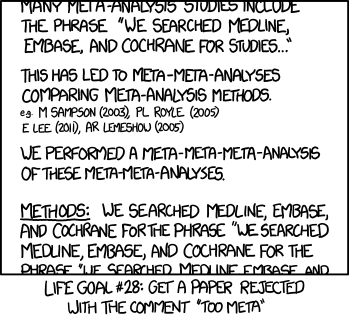Ok, now do coffee.
science
A community to post scientific articles, news, and civil discussion.
rule #1: be kind
I haven't seen a lot, health-wise, that suggests coffee is detrimental. Environmentally it's a harder sell every year with climate change and the number of coffee drinkers still yet to peak, but the economics will counter that soon enough.
A study of studies? That's interesting. I wonder how often that happens? I should do a study about it. A study of studies about studies.
A review of studies is a meta-analysis. What you're describing is a meta-meta-analysis, which is also a thing! Here's one I found from a cursory search..

Alt text: Life goal #29 is to get enough of them rejected that I can publish a comparative analysis of the rejection letters.
Also, RoundUp is so safe you can drink it!
https://youtu.be/QWM_PgnoAtA?t=26
The cognitive dissonance...
Is it dosage related or is any amount of red meat bad? And by red meat is it beef in particular or does it also include lambs and camels?
From a health perspective you can simplify it to mammals = red meat. Birds, fish, reptiles, insects etc = not red meat.
And yeah it's dosage based. Generally speaking you want to stay under 350g (by cooked weight) red meat a week. More than 500g a week is when it starts to be consistently linked with higher health risks. If you want to be really technical it could be said 0g is better than 350g, but in this range the increased risk tends to be near insignificant.
I'll preface this by saying I didn't read the article, nor did I read any of the studies and underlying methodology so it has probably been addressed and corrected for but like a few of the other commentors have mentioned, by measuring it based upon consumption of a single item, it would be hard to see if it really just showed an indicator of overall consumption as opposed to a singular food being the cause.
Lets say one of our sample respondents consume 350g of red meat on average in a week and that consisted of approximately 10% of their diet (by weight). Compare that to a person who had 350g of red meat on average in a week and it consisted of approximately 5% of their diet (by weight). This would be an Extreme example but the second person is literally consuming twice the amount of food (by mass).
And this is yet another reason why we need independent science funding, kids
Science has been canceled until 2028
Found the American.
True, but also want to emphasize that this has worldwide implications, the NIH is a major contributor to clinical research. Probably more harmful if it produces garbage data than less data
I've had my team of "experts in the obvious" work on this for one and a half minutes and they came to the same conclusion. This is a human greed business issue, not a science one.
No shit. Nice someone did the study so they could get there.
Capitalism bitch!
The issue with many of these studies is that they compare people who eat red meat to those who either avoid it specifically or don’t eat meat at all. The problem is, red meat isn’t the only variable at play. Vegans and vegetarians, in particular, are likely to have much healthier lifestyles overall than someone who eats red meat - which is more or less synonymous with the “average person.”
What I’d really like to know is the difference between red meat eaters with healthy lifestyles, compared to both the average person and those who don’t eat meat at all.
Would you be able to give examples of healthier behaviors that vegans and vegetarians perform that the general population does not?
If one made their choice to abstain from meat for ethical reasons and not health reasons I'm not sure their lifestyle would be drastically different from their counterparts, then again I'm not sure what particular behavior patterns you are referring to which could throw off studies.
I abstain from meat for ethical reasons, a similar ethical reason encourages me to use public transit and bike instead of driving, to reduce my impact on life and the environment. This is anecdotal but most vegans/vegetarians I've known are concerned with their impact in general, it's rare that they only obstain from eating meat but do everything else as an average US meat-eated would.
Did you read how any of the referenced studies were structured to confirm this assumption?
Most of the studies include processed meat like salami, which has known carcinogens and conflates the result to all red meat.
Ain't that a surprise. Studies on the effects sugary drinks have on your health backed by Coca Cola are also funny
"I just take scientists out and give them a bunch of funding for their research, and they always give me the results I want. Now of course they could always say no, but they won't because of the implication. You know, that if they produced results that disagreed with me, that I would refuse to fund future studies. Of course I would never do that, but they don't know that. So they give positive results for me. You know, because of the implication."
And this kind of shit unfortunately is fuel for anti-vaxxers and conspiracy types. It's not just misinformation on social media that we have to thank for people's mistrust, it's also the scientists that downplayed how bad sugar is or who turned a blind eye to what cigarettes do in the interests of money.